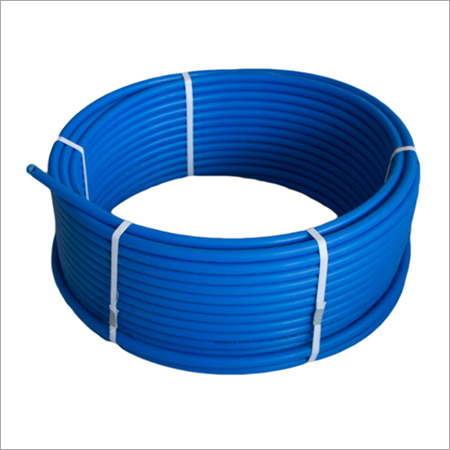
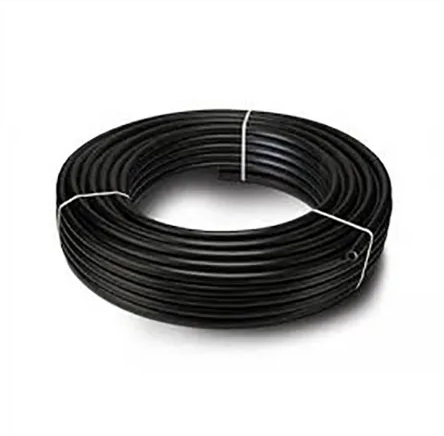
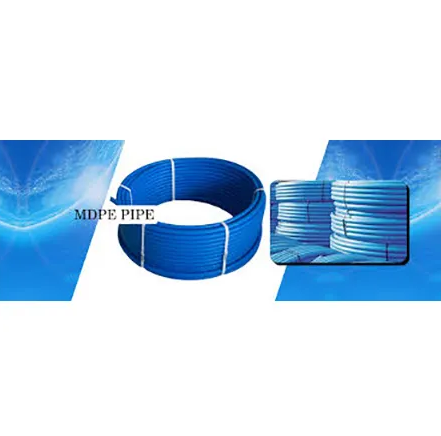
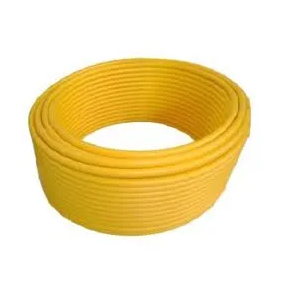
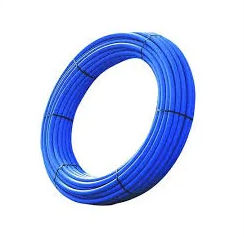
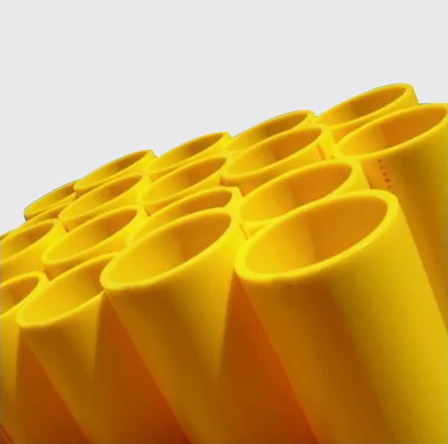
MDPE Pipe
12.0 INR/Meter
Product Details:
- Application Structure Pipe, Hydraulic Pipe
- Type Seamless
- Shape Round
- Connection Female
- Color Blue
- Click to view more
X
MDPE Pipe Price and Quantity
- 12.0 INR/Meter
- 1000 Meter
MDPE Pipe Specification
- Seamless
- Blue
- Round
- Female
- Structure Pipe, Hydraulic Pipe
MDPE Pipe Trade Information
- Cash Advance (CA), Cash in Advance (CID)
- 10000 Meter Per Day
- 7 Days
- Yes
- Asia
- All India
Product Description
Abhay Polyplast is a Rajkot based manufacturing company that produces pipes, like MDPE pipe. This is a water pipe used for delivering water in homes and commercial establishments. The recyclable Medium Density Polyethylene pipe can supply water at high pressure. Customers can buy this durable and seamless plastic pipe in size they need for creating a pipeline in new building or replacing the old pipeline with MDPE pipe. This pipe can be easily undergrounded without worrying about any damage or deterioration in quality. This pipe can resist crack and shock. Changes in temperature would not harm the quality of this pipe, multiple pipe fittings can be used for the installation of the pipeline.
Advantages of MDPE pipe:
1. Flexibility: These pipes are relatively flexible, which makes them easy to handle and install, especially in situations where the pipeline needs to navigate around obstacles or follow uneven terrain. This flexibility also reduces the need for extensive joint fittings.
2. Resistance to Cracks and Breaks: These pipes exhibit good resistance to cracks and breaks, even in cold weather conditions. This property makes them suitable for outdoor and underground applications, as they can withstand ground movement and environmental stresses.
3. Corrosion Resistance: MDPE pipes are highly resistant to corrosion from chemicals, acids, and other substances, making them suitable for transporting various types of fluids, including potable water, industrial chemicals, and wastewater.
4. Lightweight: MDPE pipes are lightweight compared to many other pipe materials, such as metal pipes. This makes them easier to transport, handle, and install, reducing labor and equipment costs.
5. Longevity: Properly installed and maintained MDPE pipes can have a long service life, offering durability and reliability over time. They can resist degradation from exposure to sunlight, moisture, and environmental factors.
6. Smooth Interior Surface: These pipes have a smooth interior surface, which helps in maintaining a consistent flow of fluids and minimizes friction losses. This is particularly important in applications where flow efficiency is critical.
7. Ease of Installation: MDPE pipes are often joined using heat fusion techniques, which results in strong and leak free connections. The joints are as strong as the pipe itself, reducing the likelihood of leaks and ensuring the integrity of the pipeline.
8. Economical: MDPE pipes are generally cost-effective compared to some other pipe materials, such as metal or high-density polyethylene (HDPE) pipes. This makes them a preferred choice for a wide range of applications, especially where budget considerations are important.
9. Environmentally Friendly: These pipes are made from a type of polyethylene, which is considered a relatively environmentally friendly material. They can be recycled and reused, reducing their impact on the environment.
10. Versatility: Medium Density Polyethylene pipes are used in various applications, including water supply, irrigation, gas distribution, industrial processes, and more. Their versatility makes them suitable for a wide range of projects.
Applications of MDPE pipe:
1. Water Supply: These pipes are often used for transporting potable water and other non-potable water supplies. Their resistance to corrosion, chemical degradation, and smooth interior surface make them suitable for delivering clean water to homes, businesses, and public facilities.
2. Gas Distribution: MDPE pipes are commonly used for distributing natural gas and other gases. They offer good resistance to the substances found in gas lines and provide a secure and leak-resistant option for delivering gas to homes and industries.
3. Irrigation: These pipes are used in agricultural and landscaping irrigation systems. Their flexibility and ability to withstand UV radiation make them suitable for outdoor use, and they can be easily laid out in various configurations to deliver water to plants and crops.
4. Industrial Applications: These pipes are used in various industrial processes to transport chemicals, acids, and other fluids. Their resistance to corrosion and abrasion, along with their smooth interior surface, make them a reliable choice for conveying different types of liquids.
5. Wastewater and Sewage: Medium Density Polyethylene pipes are used for transporting wastewater and sewage from homes, industries, and municipalities to treatment facilities. Their durability and resistance to chemicals ensure the safe transport of potentially corrosive substances.
6. Geothermal Systems: MDPE pipes are employed in geothermal heating and cooling systems. They are used to circulate water or heat transfer fluids underground to harness geothermal energy for heating and cooling buildings.
7. Cable Protection: MDPE pipes are sometimes used as protective conduits for underground cables, such as electrical, telecommunications, or fiber optic cables. The pipes shield the cables from external elements, preventing damage and ensuring their longevity.
8. Landfill Leachate Collection: In landfill sites, MDPE pipes are used to collect and transport leachate (liquid that forms as water passes through waste materials). The pipes are resistant to the potentially corrosive nature of leachate and ensure its proper management.
9. Renewable Energy Systems: MDPE pipes are used in solar water heating systems and other renewable energy installations. They can transport heat transfer fluids that capture and distribute thermal energy from renewable sources.
10. Aquaculture and Fish Farming: MDPE pipes can be used in aquaculture systems to transport water, oxygen, and other necessary fluids to fish tanks and ponds. Their resistance to chemicals and durability are advantageous in aquatic environments.
11. Emergency Water Supply: In emergency situations or temporary installations, MDPE pipes can be quickly deployed to provide temporary water supply solutions for disaster-stricken areas or events.
12. Mining Operations: MDPE pipes are used in mining operations to transport water, slurry, and other fluids. Their resistance to abrasion and chemicals makes them suitable for the demanding conditions found in mining environments.
FAQ:
Q1: What is MDPE?
Ans: MDPE stands for Medium Density Polyethylene. It's a type of thermoplastic material that is commonly used to make pipes for transporting fluids and gases. MDPE pipes are known for their flexibility, durability, and resistance to corrosion and chemicals.
Q2: What are the advantages of using MDPE pipes?
Ans: Some advantages of Medium Density Polyethylene pipes include flexibility, resistance to cracks and breaks, corrosion resistance, lightweight, longevity, smooth interior surface, ease of installation, cost-effectiveness, environmental friendliness, and versatility.
Q3: Where are MDPE pipes commonly used?
Ans: These pipes are used in various applications, including water supply, gas distribution, irrigation, industrial processes, wastewater and sewage transport, geothermal systems, cable protection, landfill leachate collection, renewable energy systems, aquaculture, and more.
Q4: How are MDPE pipes joined together?
Ans: Medium Density Polyethylene pipes are typically joined using heat fusion techniques. This involves heating the ends of the pipes until they melt and then pressing them together to form a strong and leak-resistant joint. Heat fusion results in joints that are as strong as the pipe itself.
Q5: Are MDPE pipes suitable for potable water applications?
Ans: Yes, Medium Density Polyethylene pipes are suitable for potable water applications. They are resistant to corrosion and chemical degradation, making them a safe choice for transporting drinking water. However, it's important to adhere to local regulations and standards for potable water systems.
Q6: Can MDPE pipes be used outdoors?
Ans: Yes, MDPE pipes are often used outdoors due to their resistance to UV radiation and environmental stresses. They are commonly used for irrigation systems, gas distribution, and other applications that require exposure to the elements.
Q7: How long do MDPE pipes last?
Ans: Properly installed and maintained MDPE pipes can have a long service life, often ranging from several decades to over 50 years, depending on factors such as operating conditions, environmental factors, and the quality of installation.
Q8: Can MDPE pipes be recycled?
Ans: Yes, Medium Density Polyethylene pipes can be recycled. They are made from a type of polyethylene, which is recyclable. Proper recycling processes can help reduce their environmental impact.
Q9: Are MDPE pipes suitable for high-pressure applications?
Ans: MDPE pipes are generally used for medium-pressure applications. For high pressure applications, you might consider using pipes made from materials like high-density polyethylene (HDPE) or other suitable materials designed for higher pressures.
Q10: Can MDPE pipes be used for gas lines?
Ans: Yes, Medium Density Polyethylene pipes are commonly used for gas distribution. They offer good resistance to the substances found in gas lines and provide a secure and leak-resistant option for delivering natural gas and other gases.
Tell us about your requirement

Price:
Quantity
Select Unit
- 50
- 100
- 200
- 250
- 500
- 1000+
Additional detail
Mobile number
Email










